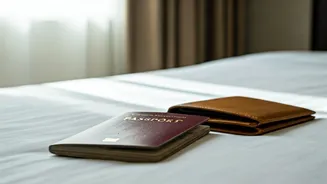Unsecured Passport Storage
One of the most fundamental rules for passport safety is proper storage. Never leave your passport unattended in easily accessible places like hotel rooms,
rental cars, or public areas. Instead, keep it locked in a hotel safe or a secure, hidden compartment. Think about investing in a travel wallet or pouch designed to protect your passport and other important documents. Additionally, always be mindful of your surroundings to prevent theft or loss, which could lead to identity theft or complications while traveling. Prioritize securing your passport at all times, whether you're in transit or at your destination, to ensure a stress-free travel experience.
Ignoring Expiration Dates
Failing to check your passport's expiration date well in advance is a major blunder. Many countries require passports to be valid for at least six months beyond your planned return date. Therefore, review your passport's expiry date before booking your trip. Apply for renewal well ahead of time, as processing times can vary. Do not assume that your passport is still valid just because you have not used it recently. Moreover, if you have a passport with a very limited validity, you might get denied entry. Thus, always check the validity of your passport before and after planning any trip to avoid last-minute panic and travel disruptions.
Losing Your Passport
Losing your passport is a traveler's nightmare, so taking proactive steps to minimize the risk of loss or theft is vital. Always keep your passport in a secure place, such as a travel wallet or a hidden pocket. Make copies of your passport and keep them separately from the original, storing them in your luggage or cloud storage. Notify the local police and your embassy or consulate immediately if your passport is lost or stolen. Prompt reporting can help you obtain a replacement passport and avoid potential identity theft. Being vigilant about your belongings and reporting any loss or theft promptly can make a difference in your travel security.
Sharing Passport Info
Be cautious about sharing passport information online or with untrusted sources. Refrain from posting photos of your passport on social media, as this information can be used for identity theft. Only provide your passport details to secure and official entities. Be careful about unsolicited requests for your passport number or other personal information online or via email. Always protect your personal data and double-check the authenticity of any website or entity requesting your passport details. Moreover, protect your information, and refrain from sharing passport details to avoid the risk of identity theft.
Damaging Your Passport
Treat your passport with care, as any damage can render it invalid. Avoid folding, tearing, or getting it wet. Keep it in a protective cover to minimize wear and tear. If your passport gets damaged, you must get it replaced. Any alteration can lead to travel delays and rejection by customs officials. Inspect your passport regularly for any signs of damage, and report any issues to the issuing authority. Consider the passport as a sensitive travel document and take every step to preserve its validity and appearance for travel.
Ignoring Entry Requirements
Every country has different entry requirements, which may include visa requirements, vaccination certificates, and other documentation. Do your research and confirm the necessary documentation before your trip. Failing to meet these requirements can result in denied boarding or entry. Be mindful of transit visas if your journey includes stopovers in multiple countries. Check the latest travel advisories and regulations for your destination. Verify that your passport meets the validity requirements, and have any required visas or other documents ready at hand. Staying informed about entry requirements will prevent potential travel issues.
Posting Travel Details
Exercise caution when sharing your travel plans on social media, including your flight details, accommodation, and itinerary. Posting this information could make your home vulnerable to burglary while you are away. Wait until you return from your trip to share details online. Be careful about the photos you share on social media. While it may seem harmless, posting pictures with your passport can make you vulnerable. Protect your privacy and security by carefully considering what you share online. Moreover, avoid sharing travel details on social media before you travel to protect your privacy.
Neglecting Contact Information
Ensure your passport contains up-to-date contact information. While most passports contain an emergency contact, it’s wise to also carry a separate card with emergency contact information. Carry a separate copy of your passport and contact information, including your embassy or consulate, in case your original gets lost or stolen. Update your information regularly to reflect your current address, phone number, and email. Keeping your emergency contacts and other vital details available allows authorities to contact your loved ones if something goes wrong during your travels. This is very important during travel for security.












